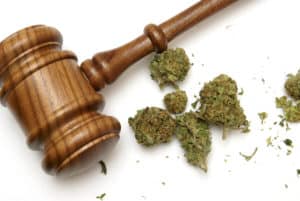NJ May Reclassify Marijuana in the New Jersey Drug Schedules

The request to reclassify marijuana in the New Jersey Drug Schedules was brought before the Appellate Division by Steven Kadonsky, who was sentenced to life in prison after being convicted on marijuana trafficking charges. Kadonsky argued that the Compassionate Use Medical Marijuana Act, which legalized medical marijuana in New Jersey, paved the way for marijuana’s reclassification.
Marijuana as a Schedule I Drug
Currently, marijuana is a Schedule I Controlled Dangerous Substance in New Jersey. In order to be classified as a Schedule I Drug, the Division of Consumer Affairs must determine a drug has no accepted medical use in treatment in the United States or lacks accepted safety for use in treatment under medical supervision (N.J.S.A. 24:21-5(a)). The Compassionate Use Medical Marijuana Act fundamentally contradicts this determination, stating:
“Modern medical research has discovered a beneficial use for marijuana in treating or alleviating the pain or other symptoms associated with certain debilitating medical conditions…Compassion dictates that a distinction be made between medical and non-medical uses of marijuana. Hence, the purpose of this act is to protect from arrest, prosecution, property forfeiture, and criminal and other penalties, those patients who use marijuana to alleviate suffering from debilitating medical conditions, as well as their physicians, primary caregivers, and those who are authorized to produce marijuana for medical purposes.”
The Case
According to Kadonsky, the Act clearly recognizes the medical use of marijuana, thus contradicting the current classification as a Schedule I Drug. Kadonsky contends marijuana should be reclassified as a Schedule IV controlled dangerous substance. Schedule IV drugs have some accepted medical use in treatment in the United States. The prescription drug Xanax is a common example of a Schedule IV drug.
When Kadonsky submitted his proposal to the NJ Division of Consumer Affairs, its current director Steven Lee rejected the proposal on the basis that he doesn’t have the authority to reclassify marijuana without contradicting current federal law. Under current federal law in the U.S., marijuana is classified as a Schedule I dangerous narcotic. In other words, marijuana is still entirely illegal under The Controlled Substances Act (CSA) (21 U.S.C. § 811) of 1970.
The Decision
During Appellate proceedings in this case, the panel heard from a teenage girl who suffers from epilepsy. The girl, referred to solely as G.B., uses marijuana to treat the pain and discomfort associated with her condition. After hearing arguments from both sides, the Appellate panel decided New Jersey should at a minimum consider reclassifying marijuana in the Drug Schedules. Appellate Division Judge Michael Guadagno said, “[W]e conclude that the director erred in determining he lacked the authority to reclassify marijuana without a change in existing federal law.”
The Significance
As it stands under New Jersey law, it is illegal to possess marijuana unless you obtain the drug with a valid prescription from a licensed doctor at a state-approved medical marijuana dispensary. If these circumstances don’t apply, possession of marijuana is a criminal offense in violation of N.J.S.A. 2C:35-10. This statute distinguishes between two levels of marijuana possession: under 50 grams and over 50 grams. If you are over the 50-gram threshold, you will be charged with an indictable crime (felony). Felonies are punishable by a New Jersey State Prison sentence for those convicted. Under the 50-gram mark is a disorderly persons offense, punishable by up to 6 months in the county jail.
There are also criminal charges for possession of marijuana with intent to distribution and marijuana distribution. These offenses are addressed under the same statute, N.J.S.A. 2C:35-5. As one might expect, as the amount of marijuana associated with the offense increases, the potential penalties become increasingly severe. Although this may seem scary, it’s important to know there are many defenses that can be used to beat marijuana charges in New Jersey.
At The Tormey Law Firm, our highly experienced attorneys defend clients arrested for marijuana in courts across state on a weekly basis. Whether you are facing felony marijuana charges or you have a municipal court case for marijuana possession, we can help. Contact us anytime online or call (201)-556-1570 for a free consultation.
Arrested with Marijuana in NJ? Need Lawyer
For additional information pertaining to this matter, access the following article: State Must Reconsider Marijuana’s Drug Classification, Court Says

